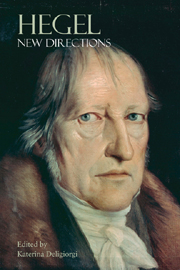Book contents
- Frontmatter
- Contents
- Contributors
- Acknowledgements
- Abbreviations
- Introduction: On reading Hegel today
- 1 Hegel on conscience and the history of moral philosophy
- 2 The apperceptive I and the empirical self: towards a heterodox reading of “Lordship and Bondage” in Hegel's Phenomenology
- 3 Hegel, McDowell and recent defences of Kant
- 4 Substance, subject and infinity: a case study of the role of logic in Hegel's system
- 5 Dialectic as logic of transformative processes
- 6 Hegel, ethics and the logic of universality
- 7 Recognition and reconciliation: actualized agency in Hegel's Jena Phenomenology
- 8 The contemporary relevance of Hegel's practical philosophy
- 9 Catching up with history: Hegel and abstract painting
- 10 New directions in Hegel's philosophy of nature
- 11 Hegel and the gospel according to Immanuel
- 12 What is conceptual history?
- 13 On Hegel's interpretation of Aristotle's psyche: a qualified defence
- Bibliography
- Index
10 - New directions in Hegel's philosophy of nature
- Frontmatter
- Contents
- Contributors
- Acknowledgements
- Abbreviations
- Introduction: On reading Hegel today
- 1 Hegel on conscience and the history of moral philosophy
- 2 The apperceptive I and the empirical self: towards a heterodox reading of “Lordship and Bondage” in Hegel's Phenomenology
- 3 Hegel, McDowell and recent defences of Kant
- 4 Substance, subject and infinity: a case study of the role of logic in Hegel's system
- 5 Dialectic as logic of transformative processes
- 6 Hegel, ethics and the logic of universality
- 7 Recognition and reconciliation: actualized agency in Hegel's Jena Phenomenology
- 8 The contemporary relevance of Hegel's practical philosophy
- 9 Catching up with history: Hegel and abstract painting
- 10 New directions in Hegel's philosophy of nature
- 11 Hegel and the gospel according to Immanuel
- 12 What is conceptual history?
- 13 On Hegel's interpretation of Aristotle's psyche: a qualified defence
- Bibliography
- Index
Summary
If any part of Hegel's philosophy is dated, lacking relevance to the modern world, it is his philosophy of nature. In developing its argument, and when lecturing on its various paragraphs, he refers to the science of his time. Because physics, chemistry, geology and biology have all made giant strides since then, however, the confident claims of 1830 now look rather like superstitious misunderstandings.
Indeed, Karl Popper, relying on Hegel's dissertation of 1801, claims that in his own day Hegel ignored the most recent discoveries of science, confidently arguing that there was no planet between Mars and Jupiter, even after the then classified as a planet Ceres had been discovered. As well, “Hegel's bombastic and mystifying cant” is so pretentious and full of fancies that it need never be taken seriously (see Popper 1966: 27–9).
Not surprisingly, this part of Hegel's philosophy has been little read and studied over the past two centuries. It was not translated into English until 1970, although it then appeared in two forms, in Arnold Miller's Hegel's Philosophy of Nature (1970) and in Michael J. Petry's three-volume edition of the same name (1970). Petry, however, did more. In his notes he cited the scientific texts and journals of Hegel's time, showing that Hegel was aware of contemporary theories and experimentation, and incorporated their results into his text and lectures. Far from presuming to tell nature what it should be like, we discovered, Hegel was interested in the most recent discoveries scientists had made.
- Type
- Chapter
- Information
- HegelNew Directions, pp. 177 - 192Publisher: Acumen PublishingPrint publication year: 2006
- 2
- Cited by



